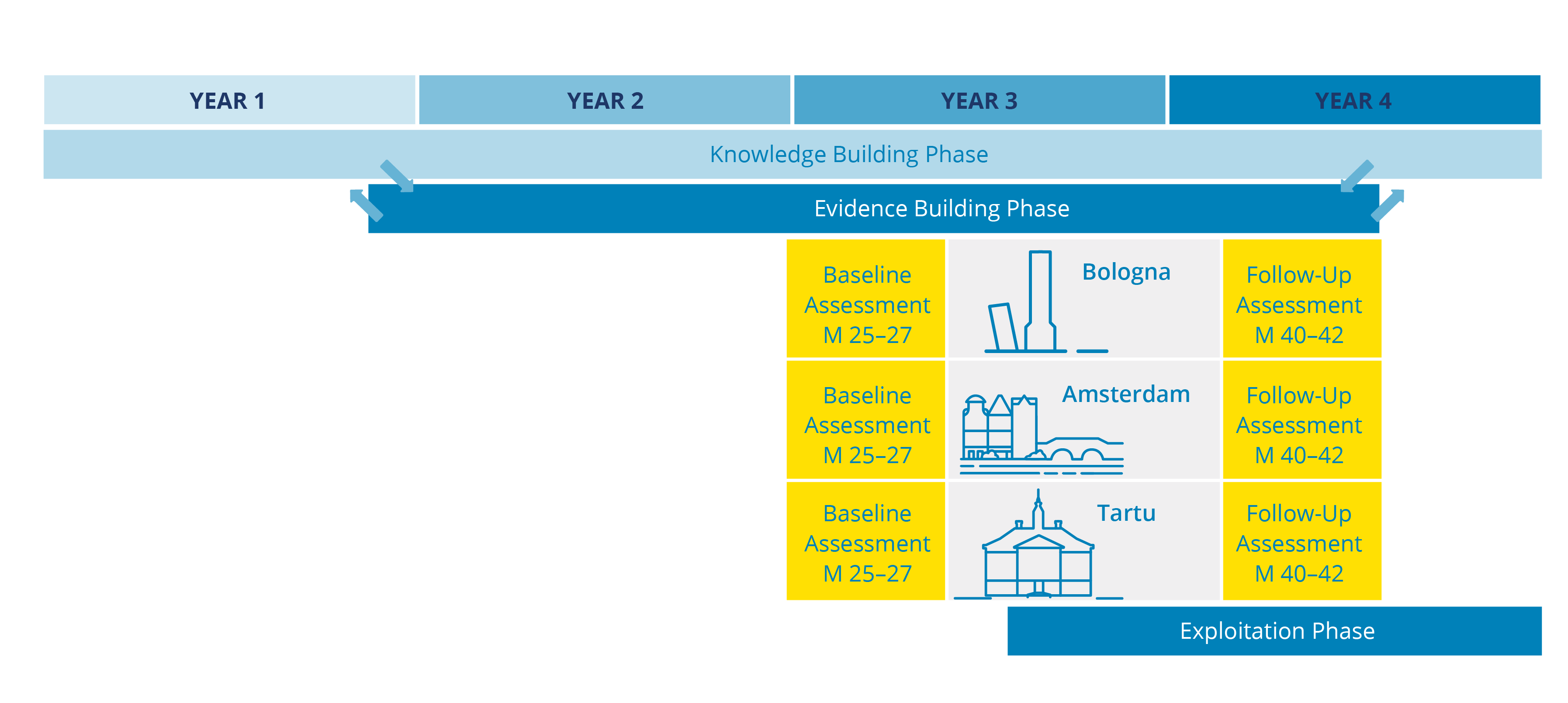
Approach

ENLIGHTENme adopts an evidence-based approach implemented in three phases: Phase 1 allows for the development and exchange of knowledge on indoor and outdoor light impact on health and wellbeing. Phase 2 focuses on the implementation of innovative lighting policies whose cost-effectiveness and impacts on health and wellbeing will be assessed by a population based trial and qualitative fieldwork. Phase 3 includes public health impacts and considerations on the decision-making process through a multi-stakeholder involvement and transdisciplinary approach addressing challenges and policy needs in the urban lighting sector.
- Phase 1: Knowledge Building
Throughout the project life-time, ENLIGHTENme gathers and systemises existing knowledge about the impact of lighting policies and innovative indoor and outdoor lighting interventions on people’s health and wellbeing. This knowledge will be made available on the Urban Lighting and Health multiscale Platform, a web-based platform organised in three levels:
- the ENLIGHTENme Atlas collects existing knowledge about evidence and good practices on urban lighting for health and wellbeing.
- the city-level Urban Lighting and Health Maps highlights correlations and dependencies among socio-economic determinants, urban/lighting patterns as well as lighting detection from satellite and population health status and mental wellbeing indicators for the three ENLIGHTENme Cities Bologna, Amsterdam and Tartu. This allows for shortlisting city districts according to particular characteristics such as prevalence of health inequalities and levels of light exposure.
- the district-level multiscale 3D urban model, which creates a detailed 3D representation of the target districts in the three ENLIGHTENme cities. It lays the foundation for the development of an urban lighting scenarios simulation tool, the ENLIGHTENme Decision Support System (DSS). The DSS aims to support urban planners in identifying vulnerable urban areas and defining cost effective interventions while comparing the impacts of different lighting scenarios.
- Phase 2: Evidence Building
In each ENLIGHTENme city, Bologna, Amsterdam and Tartu, one target district with a prevalence of health inequalities and high levels of outdoor light exposure will be chosen to establish an Urban Lighting Lab (ULL). The ULL serves as a tool for research, co-design and public engagement throughout the one-year lighting study.
The selection of a pilot area in each target district will be determined by a technical lighting analysis that spatially documents a range of lighting parameters in the installed infrastructure and discussions with citizens and civil society engaged within the ULLs. This includes an assessment of the social and personal/psychological impact of the interventions on citizens’ perception and use of space, on experience and mental health, and on overall wellbeing and quality of life.
In addition, 500 study participants, made up of older adults, for each target district will be recruited to take part in a study to assess circadian entrainment, sleep and personal lighting exposure, as well as individual genetic background, mental and physical health status. This will test the effects of a 1-year experimental change of lighting in the pilot area in comparison to a determined “control area”.
Based on the gathered insights an ‘Evidence-based lighting-dependent risk and effects model’ and a ‘Rating system on health personal sensitivity to electric light exposure’ will be developed to derive a set of rating categories for profiling different population subgroups sensitive to electric light exposure. Accordingly, tailored recommendations on light hygiene will be proposed. This will be complemented by a cost-effectiveness analysis of the economic effects of lighting in the pilot areas and the proposed interventions.
- Phase 3: Exploitation
The studies will lead to ‘Healthy Urban Lighting Good Practice Guidelines’ for municipalities that are capable of direct incorporation into municipal infrastructure policy through Lighting Masterplans and smart city programmes. The guidelines cover evidence-based guidance on good lighting practice in relation to citizen quality of life, with a specific interest in older populations, that will address inequalities in urban participation and wellbeing. Once finalised, the guidelines will be operationalised and scaled up into the ENLIGHTENme Decision Support System (DSS) supporting municipalities in taking lighting design decisions.
A series of policy briefs on Healthy Urban Lighting will offer short and informative analyses on some of the project’s most outstanding results and will offer recommendations to policymakers, Lighting Standards Bodies and the lighting industry at EU and global level.
A Board of Lighting Companies, involving lighting companies’ producers and managers, will disseminate ENLIGHTENme results within the sector in order to raise awareness on the need to take into account health and wellbeing evidence in the marketing of new products.
By running a training programme for City Health Managers, ENLIGHTENme will contribute to the introduction of an innovative transdisciplinary role within public administrations to place health high on the lighting agenda of decision makers and key stakeholders, as well as creating awareness on urban health among the broader population, for example, by running a dedicated “Lighting up city life” campaign.



